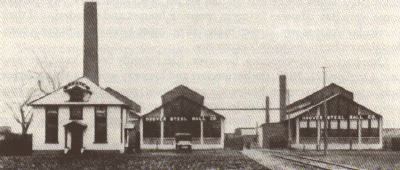| In the early part of this century, Hoover Steel Ball, a supplier of ball bearings, found success in an area where few other Ann Arbor companies could survive: manufacturing. While nearby Detroit was the center of much industrial activity, Ann Arbor had resisted the presence of such "blue collar" plants in their burgeoning city (Marwil, 83). Hoover survived, though, and grew rapidly, mostly as a result of World War I. |
| When it was established in 1913, with just a few buildings: |  |
| And four years later in 1917: |  |
| Demands for ball bearings during the War not only kept Hoover in business, but caused it to expand in size, providing numerous job opportunities for women and blacks, as well as immigrants from Greece and other countries. HooverÕs presence in Ann Arbor, then, contributed greatly to the city's diversity. |
| The plant's presence also changed the view Ann Arbors residents had of blue-collar workers. During the first World War, the number of blue-collar wage earners doubled in the city, making this class of citizens a common sight on the city's streets. Ann Arbor merchants saw these citizens as new sources of income, as Hoover's workers were more likely to spend their paychecks in town rather than traveling to Detroit to shop (Marwil, 103). |
| [Return to the tour: Economics] |
| [Multiculturalism] | [Subject Index] |